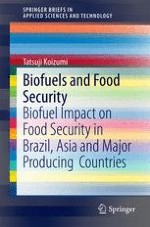Examining the relationship between biofuels and food security, this book presents an economic analysis of the competition between biofuels and food. It covers the historical and current situation of biofuels and food security in Brazil, China, Japan, USA, EU, Thailand, India, Indonesia, Malaysia, Philippines and other countries. Furthermore it demonstrates that not only feedstock of agricultural product-based biofuels, but also cellulose-based biofuels can compete with food-related demand and agricultural resources. The issue of whether this competition is good or bad for food security is explored, and this topic is examined at global, national, sub-national and household levels.
In order to deal with energy security, to reduce greenhouse gas emissions, and to strengthen agricultural/rural development, biofuel production and utilization is increasing all over the world. One of the most crucial problems is the competition for resources between biofuel and food. This biofuel and food security discussion is expected to continue into the future, and this book proposes the action that is needed to deal with this issue on various levels.
Biofuel and Food Security provides a valuable resource to undergraduates and researchers of economics, agricultural economics and renewable science, and also policy makers involved in government or international organizations. It will additionally be of interest to those employed in renewable energy and agriculture in an industrial capacity.
